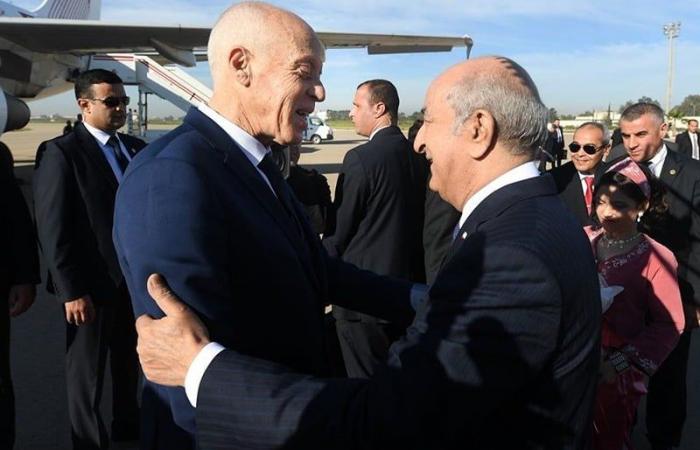In another glaring example of Tunisia’s subjugation to an increasingly arrogant Algeria, the Tunisian authorities withdrew their candidate from the executive committee of the Confederation of African Football (CAF) at the last minute in favor of the Algerian candidate. Has Tunisia definitively come under the supervision of Algeria?
Tunisia has just once again proven its weakness in the face of “strike force” Algerian by withdrawing its candidate to leave the way open to the Algerian candidate who no longer has any competition.
The Tunisian Hussein Jenayah, former member of the Tunisian Football Federation (FTF), had applied to sit on the Executive Committee of the Confederation of African Football (CAF) as representative of the North Africa zone. Except that one hour before the legal deadline for submitting applications closed, the Tunisian candidate withdrew. This calculated and political choice was made with the aim of electing the Algerian candidate, Walid Sadi, president of the Algerian Football Federation (FAF) without any competitor.
The Algerian media were seething at the idea of seeing the position so coveted by Algiers slip away from them once again like the previous year. Accusing the president of the Royal Moroccan Football Federation (FRMF), Fouzi Lekjaa, of reigning supreme within the CAF, they argued that he would support the Tunisian’s candidacy.
In July 2023, when the inexperienced and unknown president of the Algerian federation, Djahid Zefizef, lost handily to the Libyan Abdul Hakim Al-Shalmani, reappointed to his post thanks to 38 votes against 15 for the Algerian, this had caused an earthquake within the Algerian federation, leading to the shelving of Zefizef.
Algeria was not going to accept a new humiliation and conspired to grant itself this strategic position within the CAF at the expense of Tunisia which could have been elected hands down, except that the Tunisian leader preferred (? ) give this advantage to your neighbor.
Algeria’s hegemonic desires in the region no longer escape anyone except the Tunisian president, Kais Said. His attempts in Libya, wanting to take advantage of the context of political instability, were not as successful as in Tunisia. Algeria did not succeed in Niger either and even less in Mali which quickly put the generals in their place, by appealing to the UN.
Tunisia a vassal state?
It is therefore very worrying to see how Kais Saied’s Tunisia continually bows its head to foreign interference from Abdelmadjid Tebboune’s Algeria. Tunisia has always been the object of Algerian desires and this goes back to the time of Habib Bourguiba, and all the other Tunisian presidents, whether Zine El Abidine Ben Ali, Moncef Marzouki or Béji Caïd Essebsi, were able to witness it and did not have confidence in Algiers by maintaining relations tinged with distrust.
However, the current Tunisian president who was elected a few days apart from his Algerian counterpart, and both having no political experience, found in each other support and a form of reassuring friendship. Except that in reality, this translates into a posture where Tunisia sees itself with its arm twisted, particularly financially, in front of an Algeria which takes it for one of its “Wilayas”.
An Algerian political expert named El Houari Tegersi declared this without hesitation on the Sky News Arabia channel, affirming that Tunisia is considered one of the “Wilayas” (regions) under Algeria. “To put it bluntly, Tunisia is a very important Algerian province,” he had argued.
Indeed, Tunisia, under the presidency of Kaïs Saïed, became a state under Algerian supervision. Algeria commands and Tunisia obeys with the finger and the eye. This could be seen during the presidential reception given to the leader of the Polisario separatist militia, Brahim Ghali, during the Japan-Africa summit (TICAD 8) organized in Tunis, even though Japan does not recognize the “sadr” and had not invited the separatist entity. Tunisia had acted under orders from Algeria because President Saïed had sent the Prime Minister at the time, Najla Bouden, to welcome many African leaders.
In October 2022, during the vote on the Security Council resolution on the Sahara and while Tunisia sat as a non-permanent member, Tunis decided to abstain from voting, further proof of its vassalization for the benefit of the Algeria and attacks on the superior interests of Morocco.
Today’s Tunisia does not see the threat that Abdelmadjid Tebboune represents for its own sovereignty, and ignores all the signals that indicate that Algiers exercises power over its internal politics. The affair of the French Algerian Amira Bouraoui exfiltrated by France via Tunisia provoked a reaction from the Algerian Ministry of Foreign Affairs which had denounced a “violation of national sovereignty”as if Tunisia was part of its sovereignty.
This affair gave rise to humiliation of Tunisian citizens at the borders with Algeria, the dismissal of the Minister of Foreign Affairs and Tunisian security officials, enough to once again prove the weight of Algeria over Tunisia.






